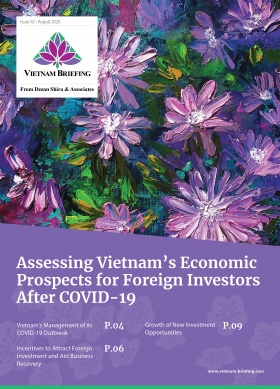Trends and Opportunities in Online Gaming: Taking Vietnam’s Gaming Industry to the Next Level
- The COVID-19 pandemic has reignited an interest in Vietnam’s already growing online gaming industry, which continues to see high growth rates and increasing revenues.
- Mobile games developed by foreign gaming giants dominate the market, but opportunities exist in other sub-sectors including locally-developed casual games.
- Foreign investors will have to navigate and abide by Vietnamese regulations in order to obtain the required license for their product, an important step in establishing their business in the country.
With countries around the world ordering their citizens to stay at home to fight off COVID-19, the gaming and e-sports (or electronic sports) industry has taken off. However, even before the pandemic, there were expectations that gaming would grow exponentially – not only in developed regions but also in fast-developing countries like Vietnam.
This article looks at some enabling factors for growth, trends, and opportunities for investors and developers interested in Vietnam’s promising gaming market.
An overview of emerging trends
A study by market research company Niko Partners and Google predict that Vietnam’s e-sport market will hit a 28 percent five-year compound annual growth rate (CAGR), the highest in Southeast Asia. Revenues from online games in Vietnam are expected to reach US$10.1 million this year, a 16 percent increase from 2019.
Several factors contribute to making Vietnam an attractive growing market for the gaming industry. Smartphone penetration in Vietnam is very high: more than 50 percent of the population uses smartphones. High-speed internet coverage, including 4G networks, continue to be more widespread, allowing users to play on the go.
There are currently around 3.99 million gamers in the country, almost two-thirds of whom are between the ages of 18 and 30. With more than half of Vietnam’s population under the age of 25, the youth segment is an important driver of growth for the gaming market.
Sub-sectors in the gaming industry
- Mobile games: Mobile is currently the dominant form of online gaming in Vietnam, contributing to more than half of the industry’s revenues.
- Online gambling: Casino games such as roulette, blackjack, and slots can be played online allowing people to use real money. With traditional sports betting already popular in Vietnam and a wide array of e-payment apps available for gamers, online casino-type games will surely take off.
- E-sports: E-sports is competitive level gaming, often involving professional players who participate in tournaments and competitions for significant sums of money as prizes. Much like in traditional sports, there are also many teams with large fanbases.
Businesses in other sectors can also capitalize on the growing number of players and fans in the gaming industry by offering services and products that complement the gaming experiences. For example, there are opportunities in digital advertising, marketing, consumer goods, beverages, delivery services, and many more that can help companies maintain operation and stay relevant in a post-pandemic world.
Who are the dominant players?
Most of the online games sold in Vietnam are produced by foreign companies.
Chinese companies account for 69 percent of multiplayer online games released in the Vietnamese market. Among the top five games, Arena of Valor and Call of Duty Mobile are both produced by TiMi Studios, a subsidiary of Tencent. This is reflective of China’s dominance in the gaming industry. The country is home to the world’s largest gaming company, mega-conglomerate Tencent.
Other big players are South Korean and US companies, who are behind titles such as PlayerUnknown’s Battlegrounds (PUBG), League of Legends, and FIFA Online.
However, for games to be successful and popular, local knowledge of the Vietnamese market is important. Overseas developers often partner with Vietnamese publishing firms that help them navigate the market, build and manage a community, market their products, and meet local regulations.
Vietnam is also home to talented engineers who cost less than those in more developed markets. Although most of them make casual games that are simpler in terms of quality, graphics, and user interface, there are several examples of Vietnamese games that make it to overseas markets, such as Caravan War and Tiles Hope: EDM Rush! Thus, there is a lot of potential that can be leveraged.
Licensing: first step for market entry
For foreign companies to have their game available in Vietnam, they must obtain a license from local authorities. The licensing process can take from 20 days to over a month and involves representatives from the Ministry of Information and Communications, the Ministry of Culture, Sports and Tourism, and the Youth Union.
Foreign companies wanting to have their games licensed face two options: they can either work with Vietnamese studios that help them carry out the necessary procedures, or establish a branch and a representative office in Vietnam. Like previously mentioned, local knowledge is crucial in this case.
According to Decree 27/2018/ND-CP (“Decree 27”), which took effect in April 2018, the government requires that Vietnamese companies collaborating with international partners have servers in Vietnam that store users’ personal information, and must provide this data when requested by the authorities. Games in which multiple players simultaneously interact with each other cannot allow a user under 18 to play more than 180 minutes per day.
The content and images in the game must also comply with Vietnamese regulations, which may require companies to make some changes. Foreign publishers must comply with the strict local regulations or be forced to end their operations, which happened to Finland-based Supercell in 2019.
Over the last two years, the government has asked Apple and Google to take down several games from their stores due to illegal content which, according to the government, includes elements of violence, gambling, and those found to distort Vietnamese history.
Local companies face tough competition in the gaming market, but Vietnamese indie developers have found international success in making casual games. The most notable example is the Vietnam-made game Flappy Bird, which topped app stores worldwide and put Vietnamese talent on the radar.
Thus, there is no denying that Vietnam is an attractive market for those in the gaming industry and related sectors, especially given the current pandemic. Vietnam’s youth bulge, digital infrastructure, and local talent will continue to place the country as a top investment destination in the upcoming years. However, prior to venturing into this growing market, investors must do their due diligence.
About Us
Vietnam Briefing is produced by Dezan Shira & Associates. The firm assists foreign investors throughout Asia from offices across the world, including in Hanoi and Ho Chi Minh City. Readers may write to vietnam@dezshira.com for more support on doing business in Vietnam.
- Previous Article Vietnam-EU-Handel: EVFTA tritt in Kraft
- Next Article Taifunsaison in Vietnam: Wie Sie Ihr Unternehmen vorbereiten







